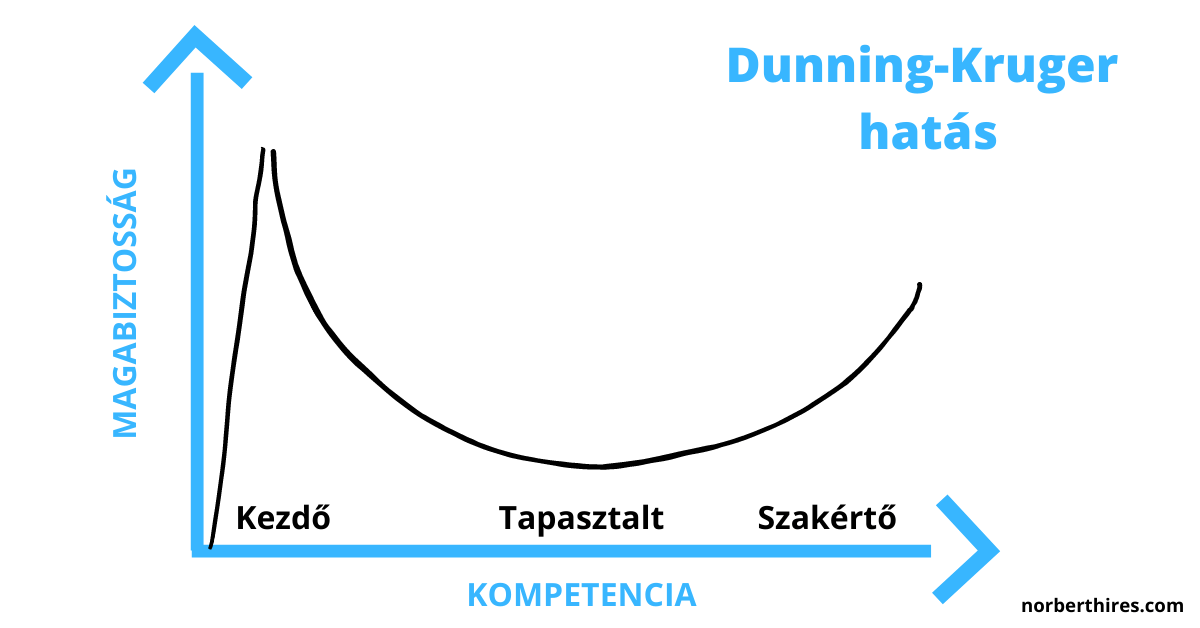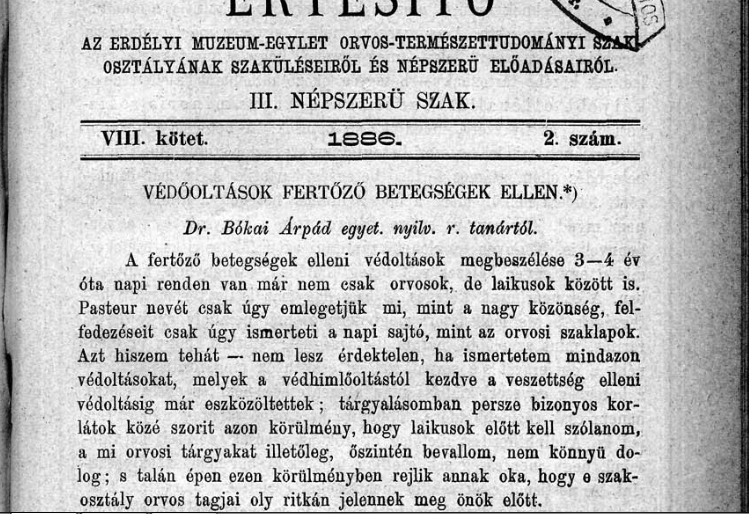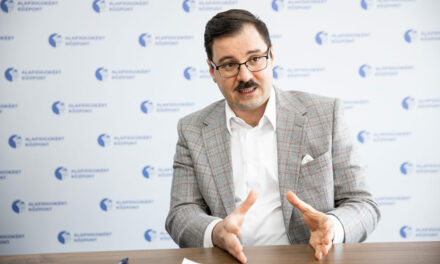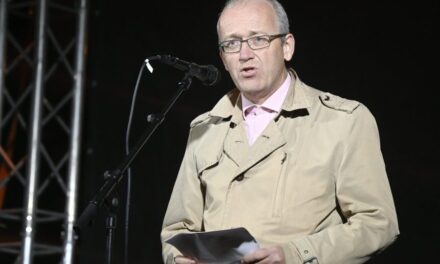It seems that, despite the scientific development of the modern world, there is still a demand for modest geniuses, but there is an oversupply of self-confident ignoramuses. This is how we stand. The Dunning–Kruger effect works.
Cornell University psychologists David Dunning and Justin Kruger formulated and then proved it in their study published in 1999. They measured the logical ability, grammatical knowledge and sense of humor of the participants in their research, while also asking them to subjectively evaluate their own abilities. Those who, based on their results, only belonged to the bottom quarter, rated their abilities as far above average. These people overestimated themselves, unable to recognize the true expertise and abilities of others, as well as their own faults. In order for inexperienced people to be able to realistically assess the real level of their abilities, they would need exactly the expertise that they do not possess.
"I know one thing for sure: that I know nothing." Socrates
The Dunning-Kruger effect comes into play when someone becomes the owner of a piece of information that they may not have known existed before. the new " knowledge " , he suddenly thinks of himself as an expert, since he does not see the whole picture. Those at the top of the confidence curve, but less outstanding in terms of their abilities, never understand criticism, since they have no basis for comparison. He honestly believes that he knows better than anyone, "the fault is not in his device", he is the real expert, rather the system that judges his performance is bad.

The victim of the Dunning-Kruger effect is therefore not uninformed, but his head is buzzing with misleading facts, half-truths and urban legends, and he feels as if all this has been combined into useful knowledge. And this is dangerous, if only because the truly competent, the "humble geniuses", as opposed to the self-proclaimed saviors of the world, tend to underestimate their abilities; they assume that others are as well informed as they are. Finally, we get to the point that a cockerel expresses his opinion sooner and more confidently than a real expert.
In the majority of cases, the development of anti-vaccination can also be attributed to the Dunning-Kruger effect, of course there are always interest groups who very consciously try to unsettle others, out of political, material interest, or other convictions.
A Brief History of Anti-Vaccination
In February 1998, an article was published in one of the world's most prestigious medical magazines, the Lancet , which shook people's confidence in vaccinations, and because of this, experts envisioned an epidemic of diseases that have almost completely disappeared, such as measles or whooping cough.
The results of Andrew Wakefield's study involving 12 children pointed to a cause-and-effect relationship between the MMR vaccine (combined vaccine against mumps, measles and rubella) and the development of autism. Wakefield encouraged parents to choose non-combined vaccines against the three diseases instead of the MMR vaccine and give them a year apart. Many parents were receptive to the proposal, so while in 1994 90% of English women considered the MMR vaccine reliable, by the beginning of the 2000s only 60% thought so, thereby dramatically reducing the number of MMR vaccinations administered .
In 1999, shortly after the publication of the study, 500, 537,000 and 535,000 in 2002, 31 studies in 2005 involving 10 million children, and 14,700,000 in 2012 did not find any connection between the MMR vaccine and between the relationship to the development of autism. And then let's record it again: Wakefield included 12, i.e. twelve, children in his study.
By the beginning of the 2000s, as a result of the process, the proportion of children vaccinated in a given year fell below 80%, which is such a low vaccination rate that an epidemic could easily break out. News of the study also reached the United States, where anti-vaccination groups quickly formed, encouraging all parents to refuse to administer not only the MMR, but all other vaccines. The result: an estimated 125,000 US children born in the late 1990s did not receive the MMR vaccine.
In 2004, Brian Deer went public with the results of his investigation, which caused quite a large press response in Great Britain. The journalist discovered that two years before the study was published, a lawyer named Richard Barr had actually hired Wakefield to fabricate evidence against the MMR vaccine. Barr wanted to get a lot of money from the damages lawsuits against the drug companies, so he gathered the plaintiffs from the circle of families who were somehow involved in the issue. In addition, an anti-vaccination organization, JABS, stood behind Barr. This group was founded by parents who believe that the MMR vaccine is responsible for their child's autistic symptoms.
In the end, it turned out that the test results were falsified in several places: although the study claimed that the autistic symptoms appeared a few days after the vaccine was administered, only one child was actually diagnosed with regressive autism, and he also had symptoms before the vaccine was administered. It is important to add that neither Wakefield nor any other research group succeeded in replicating the "results" of his own experiment, and Wakefield, a few months before his combined anti-vaccination campaign, filed a patent application for a measles vaccine.
And what is the lesson? In 2004, the Lancet apologized and retracted the study, and Wakefield's medical license was revoked by the chamber, despite this, many people still believe him, even though documents and records prove that it was a planned smear campaign. By 2011, 91% of children in Great Britain had received the MMR vaccine, bringing vaccination coverage back to pre-Wakefield counter-campaign levels. In the United States, however, the situation is getting worse, twenty years ago there were not as many measles cases as recently, even though 71 medical studies support that the MMR vaccine cannot be linked to the development of autistic disorders. Of course, who cares about scientific works, if you can also believe anti-vaccination stars (Charlie Sheen, Alicia Silverstone or Jim Carrey) who exemplify the Dunning-Kruger effect?

There is nothing new under the sun - Medical-Natural Science Bulletin from 1886
Infectious disease or vaccination?
Although the answer seems simple, nowadays it is not, and one of the decisive reasons for this is the lack of trust. The wide spectrum of nonsense spreading on social media has gone up against medical science, which is both absurd and frightening. Who should we believe? Unfortunately, this question arises in many people, but it is not difficult to answer. Still, with common sense, who should you believe? For the corner spice who heard from a doctor that...? For the cyber diver who thinks a degree doesn't matter? For the Facebook hussar, with a cat profile picture? For the money-hungry pharmacist? To the offended journalist? For the politician who wants to convert the fears of the anti-vaccines into votes? Or for professionals? It's a really hard decision. Oh no. At least not for those who don't want to fall victim to either the Dunning-Kruger effect or Covid.
Featured image: arthungry.com












